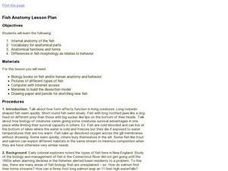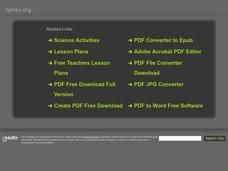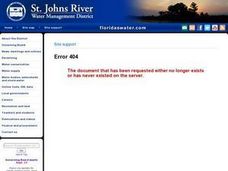Curated OER
LOSING GROUND
Students will observe wind erosion and how crop residue prevents erosion.Point out the three kinds of fields to the students. Do as much or as little instruction as needed to explain the pan with crop residue. Conservation tillage...
Curated OER
Beaver Ecology
Students explore the lives of bgeahvers. They identify the physical and behavioral adaptations that help beavers survive in their environment. Students compare and contrast how beavers influence the ecology of both forest and aquatic...
Curated OER
Fish Anatomy
Students identify and interpret the internal anatomy of the fish. They also identify and define vocabulary for anatomical parts and anatomical functions and forms. Finally, students identify and interpret the differences in fish...
Curated OER
Cause and Effect Graphic Organizer
In this literacy and graphic organizer worksheet, students read a short fable entitled, "The Ant and the Dove." They fill in 2 cause and effect graphic organizers with relationships from the paragraph.
Curated OER
What's a Swamp Good For?
Students identify the function and value of wetlands. In this lesson on appreciating wetlands, students explain how different household items can represent different aspects of the wetlands.
Curated OER
Water: A precious resource
In this water worksheet, students watch a video on water, read a passage, complete sentences, write vocabulary words, and write a paragraph. Students complete 5 activities total.
Curated OER
Trout In The Classroom
Students have trout in their classroom and complete journaling, checklists, temperature checking, and ammonia level recording. In this trout lesson plan, take weekly observation records of their trout.
Curated OER
Utah's Biomes
Fourth graders discover what a biome is and study biomes that are native to Utah in this series of lessons. They examine how Utah's biomes have changed over time due to the influence of the Mormon pioneers and other human populations.
Curated OER
Spongy Wetlands
Learners sort things that absorb and things that do not absorb, They predict, orally or in writing, what happens to houses with or without wetlands. Students build a wetland area in a meat tray to show how wetlands absorb water, and they...
Curated OER
Cypress/Tupelo Swamps
Students study the geologic history of terrain, soils, and drainage patterns. They recognize ecological processes that determine the dynamic nature of habitats. They investigate the influence of human activity on the landscape.
Curated OER
VS.3g
Third graders explore describing the interactions between the English settlers and the Powhatan people. They include the contributions of the Powhatan's to the survival of the settlers and review how the Powhatan people and the English...
Curated OER
Got Water?
Young scholars determine that delivering clean, fresh water to citizens around the world involves and affects politics, economics, international relations, and technology. They brainstorm a list of factors that might affect their town's...
Curated OER
Biomes
In this biomes worksheet, students review the characteristics of aquatic biomes and terrestrial biomes. This worksheet has 12 fill in the blank, 6 multiple choice, and 4 short answer questions.
Curated OER
Estuaries
In this estuaries worksheet, students answer short answer questions about estuaries where they live. Students complete 9 short answer questions.
Curated OER
Allegheny Portage Railroad: Developing Transportation Technology (23)
Learners research the innovative technology used in building the Allegheny Portage Railroad, and how it was applied to other projects. They discuss technological change and the effect it has on their lives.
Curated OER
Water Pollution - Group Presentation
Students investigate water pollution at a web site and apply it toward a group presentation.
Curated OER
Clarity And Turbidity
Students measure the clarity of a body of water and identify possible environmental complications that can be attributed to clarity and turbidity.
Curated OER
Florida's Springs
Students calculate the water usage for irrigation of school grounds. They use maps in determining which areas are irrigated.
Curated OER
Mapmaker, Make Me a Map!
Learners are introduced to the state quarter program and examine the Colorado state quarter. They locate Colorado on a map and create a map with a key. They discuss the state motto and examine pictures of the state's geographical features.
Curated OER
More About Water Below the Ground
Students examine groundwater and its relationship to springs, artesian wells, ordinary wells, and sinkholes. They describe the process by which sinkholes are formed. They investigate saltwater contamination and its causes.
Curated OER
Dark and Beautiful Caves
Students research how caves form. They describe the major stone formations in caves by taking notes. They construct a clay model of a cave and mark each formation making it easy to identify in the legend.
Curated OER
The Water Cycle Dance
Second graders synthesize the four parts of the water cycle by participating in a water cycle dance. They perform movements that signify each stage of the cycle.
Curated OER
Water Unit
Pupils explore ways to conserve water. After discussing water, its uses, and importance, students perform an experiment to discover how much water can be used when using a sponge. After creating water artwork, pupils determine how the...
Curated OER
N, B, and T: Pollutants Three
Students explore nutrient, bacterial, and toxic surface water pollution. They identify the amount of water they use each day and summarize the kinds of substances that cause water pollution. They predict what will happen in water...
Other popular searches
- Rivers and Streams
- Create Rivers and Streams
- Rivers and Streams Fl
- Rivers and Streams Lab
- Rivers and Streams Biomes
- Rivers Lakes Streams
- Rivers, Lakes, Streams
- Rivers and Streams Bio Mes
- Rivers Streams

























